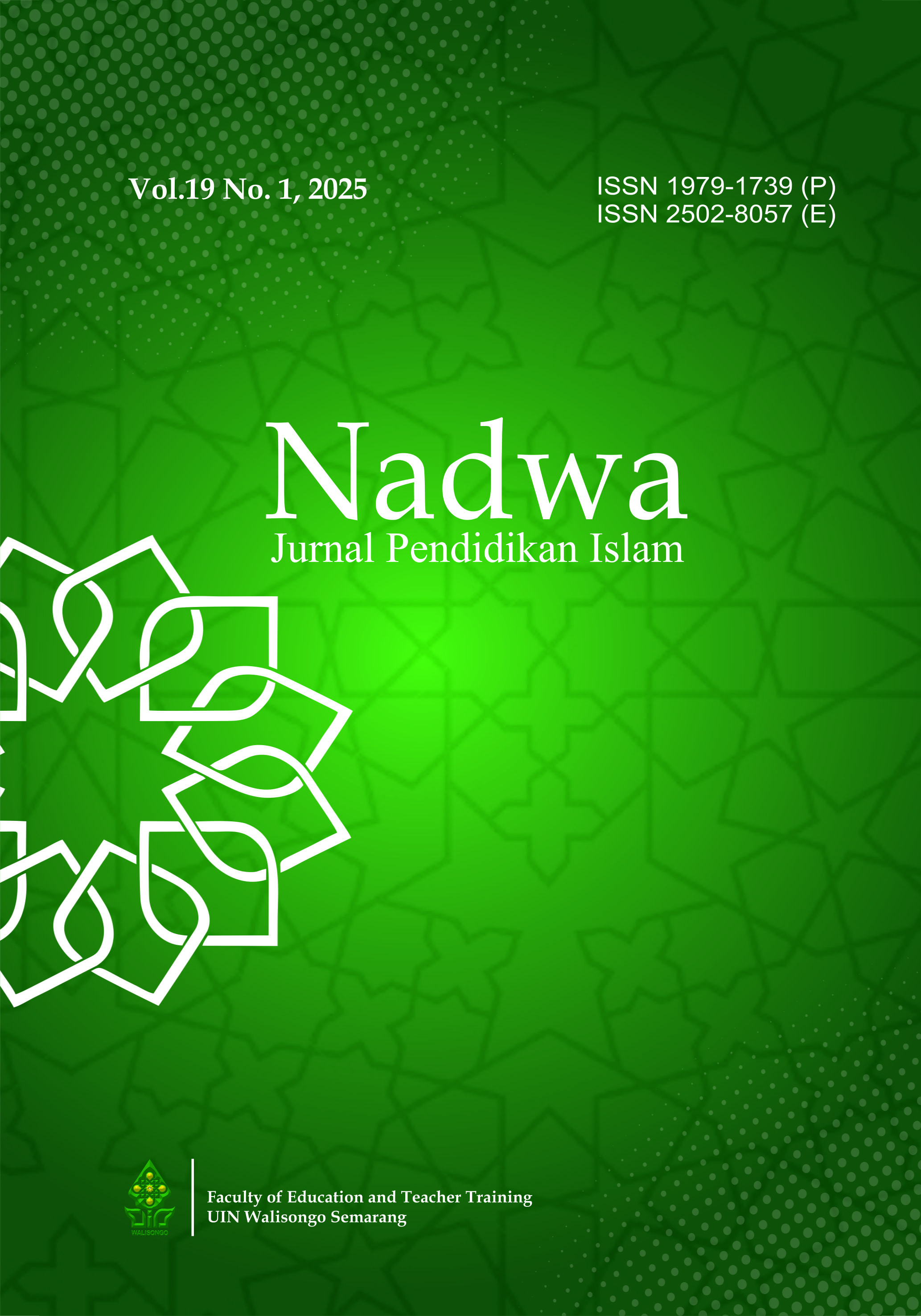Artificial Intelligence and Islamic Perspective in Student Character Assessment
Main Article Content
Abstract
Artificial intelligence (AI) is increasingly adopted in higher education, including in student character assessment. However, AI’s inability to capture spiritual aspects such as intention (niyyah), sincerity, and God-consciousness (taqwa) creates a gap between technological efficiency and the moral values of Islamic education. This study aims to explore students’ perceptions of AI-based character assessments in Islamic universities and propose a conceptual framework grounded in maqasid al-shariah. A descriptive qualitative method with a phenomenological design was employed, involving 20 purposively selected students from five academic programs at the Ar-Risalah Institute of Islamic Studies, Riau. Data were gathered through in-depth interviews, observations, and document analysis, and analyzed using the Miles and Huberman model. The findings reveal students’ distrust toward AI’s fairness, particularly its failure to assess inner spiritual dimensions, and highlight the irreplaceable role of educators in moral guidance. The study concludes that AI should be ethically guided and embedded with Islamic values to ensure its compatibility with character education in faith-based institutions. A value-sensitive AI framework can help harmonize automation with spiritual integrity, allowing Islamic higher education to adopt digital technologies without compromising its sacred pedagogical mission.
Downloads
Article Details

This work is licensed under a Creative Commons Attribution-ShareAlike 4.0 International License.
The copyright of the received article shall be assigned to the journal as the publisher of the journal. The intended copyright includes the right to publish the article in various forms (including reprints). The journal maintains the publishing rights to the published articles. Authors are allowed to use their articles for any legal purposes deemed necessary without written permission from the journal with an acknowledgment of initial publication to this journal.
The work under license Creative Commons Attribution-ShareAlike 4.0 International License.
References
Abu Bakar, M., Yusof, S. A., & Rahman, A. A. (2021). The Islamic perspective on data privacy and ethics. Journal of Islamic Ethics, 5(2), 189–205.
Abdul Ghani, A. B., et al. (2020). Techno-ethical pedagogy: Teaching digital ethics in Islamic institutions. International Journal of Ethics in Education, 6(1), 25–39.
Alabdulkareem, S., Alasmari, A., & Alqahtani, M. (2021). AI in Islamic education: Potentials and constraints. Education and Information Technologies, 26, 7325–7342.
Al-Mahameed, H., et al. (2021). Perceived justice in AI-driven academic evaluation. Journal of Artificial Intelligence and Soft Computing Research, 11(3), 145–157.
Al-Zahrani, K. (2024). Challenges and Opportunities in Implementing AI-Based Learning in Saudi Universities. International Journal of Educational Management, 38(4), 523–540. https://doi.org/10.1108/IJEM-03-2024-0167
Amin, H., & Ibrahim, M. I. (2020). The role of murabbi in spiritual education. International Journal of Islamic Educational Studies, 4(2), 100–117.
Auda, J. (2008). Maqasid al-Shariah as Philosophy of Islamic Law: A Systems Approach. IIIT.
Ben Ali, R., et al. (2020). Algorithmic bias and digital ethics in Muslim societies. AI & Society, 35(3), 651–664.
Bozkurt, A., Masalimova, A. R., & Uçan, Ö. N. (2023). Artificial Intelligence Literacy Among University Educators: A Cross-National Scoping Review. Computers & Education: Artificial Intelligence, 4, 100118. https://doi.org/10.1016/j.caeai.2023.100118
Cotton, D. R. E., Cotton, P. A., & Shipway, J. R. (2023). Academic Integrity in the Age of Artificial Intelligence: A Framework for Ethical Use. Assessment & Evaluation in Higher Education, 48(5), 655–669. https://doi.org/10.1080/02602938.2023.2180097
Furze, L., Perkins, M., Roe, J., & MacVaugh, J. (2024). Generative AI in Assessment: Pilot Testing the AI Assessment Scale in Higher Education. Learning and Instruction, 89, 102788. https://doi.org/10.1016/j.learninstruc.2024.102788
Hassan, M. K., & Mahamood, S. M. (2020). The role of maqasid al-shariah in Islamic finance and AI. International Journal of Ethics and Systems, 36(4), 593–606.
Hassan, R., Yusof, N., & Yacob, N. (2022). Toward Islamic Artificial Intelligence. Journal of Emerging Technologies in Computing Systems, 18(4), 1221–1238.
Ismail, Z., & Mohamed, R. (2021). Embedding values in AI ethics: Islamic approach. Journal of Moral Education, 50(2), 234–251.
Khan, M. S., et al. (2022). Moral actors in AI development: The Islamic design perspective. AI and Ethics, 2(3), 237–251.
Mahmoud, N., & Othman, R. (2023). Islamic design thinking in digital education. Journal of Islamic Educational Research, 7(1), 88–104.
Nasr, S. H. (2015). Islamic Science: An Illustrated Study. Kuala Lumpur: IBT.
Naser, M., Ahmad, R., & Yusof, S. (2020). Integrating spiritual reasoning in educational AI. International Journal of Islamic Thought, 18, 41–58.
Perkins, M., Furze, L., Roe, J., & MacVaugh, J. (2024). The AI Assessment Scale Revisited: Ethical Foundations for GenAI Use in Universities. Computers & Education, 190, 104292. https://doi.org/10.1016/j.compedu.2024.104292
Rahman, S., & Rahim, F. (2022). Digital ethics curriculum in Islamic higher education. Journal of Islamic Education Studies, 9(3), 202–218.
Roe, J., Perkins, M., & Ruelle, D. (2024). Student Perceptions of AI in Formative Assessment: A Comparative Study. Educational Technology Research and Development, 72(1), 23–41. https://doi.org/10.1007/s11423-024-10256-z
Sundas, T., & Abbas, N. (2025). Personality Traits as Predictors of Acceptance of Generative AI Tools in Learning Environments. Computers in Human Behavior, 150, 107069. https://doi.org/10.1016/j.chb.2024.107069
Wanty, E. J., & Eva, M. (2024). Role and Trust in AI for Faculty Development in Higher Education. International Journal of Instruction, 17(1), 77–95. https://doi.org/10.29333/iji.2024.1716a
Yusup, I., Risna, K., & Purnama, S. (2024). AI-Driven Efficiency in Higher Education: A Case Study on Character Assessment Practices. Journal of Educational Computing Research, 62(3), 712–730. https://doi.org/10.1177/07356331231201964
Zaharin, N. A., et al. (2022). Al-‘adl in AI-driven systems: An Islamic ethical framework. Ethics and Information Technology, 24(2), 199–214.






